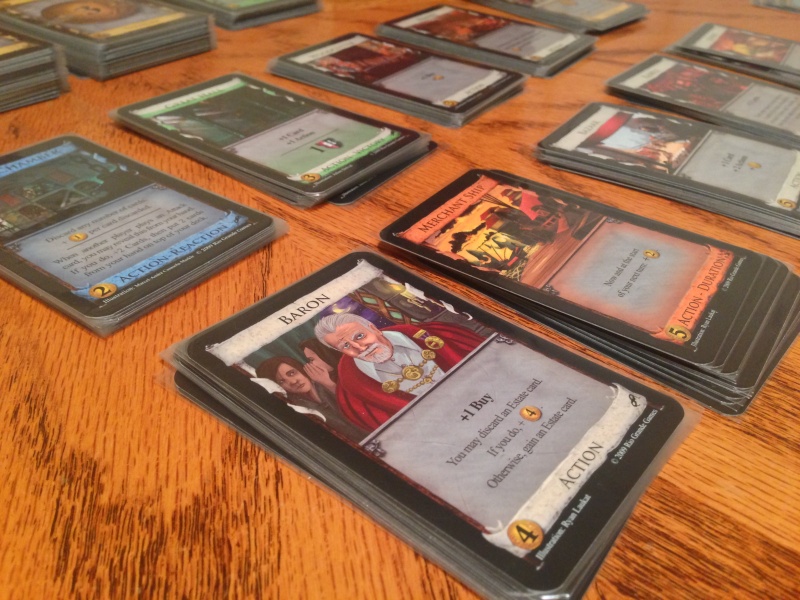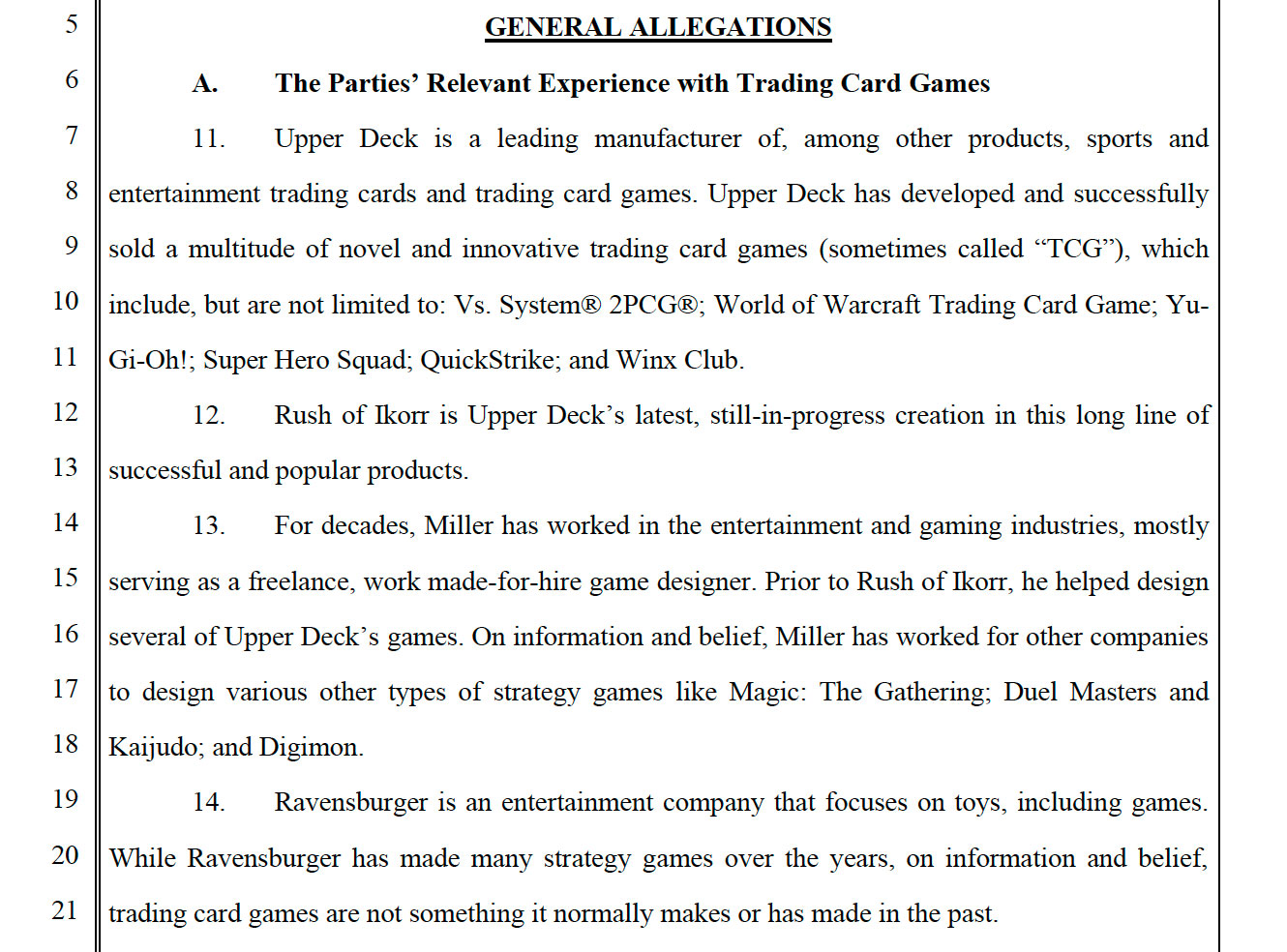One of the most anticipated games coming out this year is Disney Lorcana from veteran publisher Ravenburger. Tickets for events and Gen Con were selling like hotcakes as everyone wants to see what this latest game is all about. Well, it seems that the game won’t be without its drama, as publisher Upper Deck announced today (via a press release) that they are suing Ravensburger and a previous Upper Deck game designer Ryan Miller for “stealing and copying Upper Deck’s original game which Ravensburger repackaged and marketed as Lorcana.”
From the press release:
“We invested significant time and resources to develop a new and novel trading card game. Our current leadership values the importance of protecting intellectual property of both Upper Deck and its licensors,” said Upper Deck President Jason Masherah.
“We want gamers and fans to continue enjoying and having access to unique, innovative and immersive trading card games,” added Masherah. “We encourage competition in the industry, but also strongly believe in playing by the rules to ensure the gaming community benefits from the different creative choices by each manufacturer.”
We obtained a copy of the court brief, and reading through it, found some interesting tidbits:
INTRODUCTION
1. Upper Deck seeks to protect its intellectual property from premeditated theft by Miller. On a work for hire basis, Upper Deck engaged Miller as lead game designer to develop a major proprietary trading card game for Upper Deck called “Rush of Ikorr.” After over a year of developing Rush of Ikorr alongside Upper Deck, Miller terminated his contract with Upper Deck and, either before termination or just after, began working for Defendant Ravensburger, a direct competitor. At Ravensburger, Miller transported his work product on Rush of Ikorr, knowing such work product was owned solely by Upper Deck, into a trading card game called “Disney Lorcana” (“Lorcana”). This trading card has remarkable, uncanny similarities to Upper Deck’s Rush of Ikorr.
2. Miller’s acts in pilfering the game design Upper Deck paid him to create and using those designs to develop a competing trading card game for a competitor were aided and encouraged by Ravensburger, who now seeks to profit from the stolen intellectual property. These acts give rise to a host of causes of action under California and federal law.
Upper Deck is filing a number of charges including Breach of Contract, Fraud, “Negligent Interference with Prospective Economic Relations”, Constructive Trust, conversion, and Unfair Competition.
Here are some of their complaints about how similar the games are:
H. Lorcana Functions Just Like Rush of Ikorr
1. The basics
47. Lorcana is a TCG which can be played within an hour. It can be played one-on-one or with multiple players without major changes to gameplay mechanics.
2. Building your deck
48. To play, each player needs cards which are purchased from Ravensburger or Disney. The player uses purchased cards (or ones he/she has acquired through trading, etc.) to strategically build a deck consisting of 60 cards. There can be no more than 4 identical cards in a deck and the deck can only contain two colors of cards maximum out of 6 colors to choose from (yellow, green, blue, purple, red, or grey).
49. There are four card types: Characters (playable creatures that Challenge enemies or engage in Quests), Items (effects put into play and remain until destroyed), Actions (one-time advantages a player can initiate), and Songs (a sub-type of Actions).
50. The cards in Lorcana contain “Abilities and Effects” (i.e., keywords) which add effects to the card. The Abilities and Effects in Lorcana in many cases are copied and pasted from that of Rush of Ikorr. For example, some cards in Lorcana contain a “Support” Ability which allows the Character to provide friendly Characters with Strength. Some cards contain an Ability called “Evasive” which has the same exact effect as the “Elusive” Ability in Rush of Ikorr. Further, some cards in Lorcana also contain an Ability that has the same effect as the “Formidable” Ability in Rush of Ikorr. Because all the Lorcana cards are not yet publicly available, Upper Deck cannot know the full extent of the overlap between the cards in each game, but believes and is informed there are others.
3. Beginning to play
51. With a deck built and in hand, at the outset of the game, each player takes on the role of an Avatar or “Illumineer” Disney characters.
52. To start the game-play, players begin by drawing seven shuffled cards to their hand.
53. During the player’s turn, he/she will draw an additional card to their hand and may put a card face down into the “Inkwell” at any time. Ink is the resource players consume in order to place the cards in their hand into the field of play. For example, a card with a “Cost” of four requires four “Inks” or face down cards in the player’s Inkwell. Ink is consumed for only one round and is returned for the player’s next turn. The Inkwell functions near-identically to Rush of Ikorr’s Influence Zone.
54. After drawing a card to their hand, the player enters the “Main Phase.” During the Main Phase, players can exhaust their Ink to summon a card, activate a card’s ability, or Challenge a Questing enemy. Just like Rush of Ikorr, players cannot Quest or Challenge on the first turn a Character is summoned unless the Character has an Ability allowing it to do so.
55. Once in the field of play, players can send their Characters on Quests during the Main Phase. Quests last one turn and is the mechanism by which players earn Lore—Lorcana’s win currency. Characters are assigned a “Lore Value” which is the number of Lore the Character will earn if the Quest is successful. Lore and Lore Value function identically to Rush of Ikorr’s Gems and Raid value.
56. Characters are vulnerable to enemy Challenges while Questing. If a Challenge is performed on a Questing enemy, the cards’ Strength (damage dealt) and Willpower (damage received before banishment) are compared, where a card is banished if its Willpower is of less value than its opponent’s Strength. Like Rush of Ikorr, at the foundation of Lorcana’s gameplay is that to acquire its win currency, Lore, the player must put their Characters in a vulnerable state.
57. Also like Rush of Ikorr, the win conditions in Lorcana require players to build themselves up, as opposed to the predominant TCG win conditions of annihilating your opponent. This is through the use of the win currency “Lore,” which are gained through Questing and cannot be lost once gained. Players win Lorcana by being the first to gain twenty Lore.
58. Thus, the core gameplay loop of Lorcana is to: (1) summon Characters; (2) engage in Quests; (3) mount Challenges to stifle enemy Quests; and (4) retrieve Lore.
I am not a lawyer, so I can’t say whether the suit has merit or not. But we’ve reached out to Ravensburger for comment and will update the article if they add anything.























